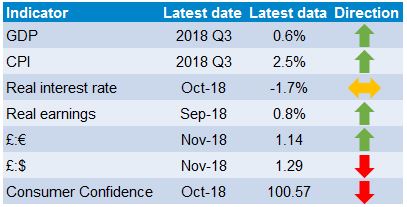Marginal growth in key economic factors
Tuesday, 4 December 2018
Latest data around economic factors suggest the UK’s economy is performing reasonably well at present. Most data has been fairly stable for some time. This could be down to the uncertainty around Brexit, which means significant changes could occur in the coming weeks/months.

Gross Domestic Product (GDP) has been strengthening during 2018, although not at a particularly high level. Despite some volatility, GDP has been averaging 0.5% since 2013. The Consumer Price Index (CPI) has picked up marginally from the previous quarter.
Sterling, as a monthly average, has weakened/strengthened marginally against the Euro and Dollar respectively. Consumer confidence has dipped slightly but has remained fairly static since August 2016.
Outlook
This could all be seen as the calm before the storm. At the time of writing, we are yet to have the UK Parliament vote on the withdrawal agreement (expected 11 December). It is very unclear what will happen and if it is not voted through, the uncertainty will likely continue. Chances are a rejection of the deal will probably result in a significant weakening of Sterling straight away. Although this has benefits for farmers, in that it would make exports more competitive, it also fuels inflation via the higher cost of imported goods, puts upward pressure on interest rates (which are used by the Bank of England to manage inflation) and downward pressure on economic growth. Economic growth is forecast to be lower than would have been expected without Brexit, and a hard Brexit will only accentuate this effect. This would mean reduced demand within the UK economy and shoppers becoming increasingly ‘savvy’ and look for increased value from their purchases.
There is no doubt that the economy is likely to suffer turbulence in the coming months. It is to what extent that remains to be seen. In the meantime there is plenty that our farmers and growers can do to prepare their businesses for Brexit and get Fit for the Future.
For more information, please visit our FFTF pages here on the AHDB website

